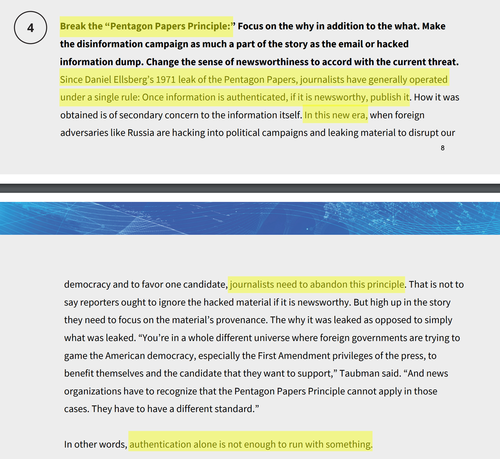Who Helped Overturn the “Pentagon Papers Principle”? The Washington Post and New York Times
Written by Matt Taibbi via Racket News,
Last December, Michael Shellenberger reported in a #TwitterFiles thread that the Aspen Institute hosted a “Hack and Dump Task Force” exercise in the summer of 2020 titled “Burisma Filter,” which he predicted with a uncanny accuracy an upcoming derogatory story in the New York Post about Hunter Biden’s lost laptop.
Film version of ‘The Pentagon Papers’ story survives, but the original principle is being released
Documents released by Shellenberger showed how at least five media figures, including David Sanger and David McCraw of the New York Times, Ellen Nakashima of the Washington Post, then-Daily Beast and future Rolling Stone editor Noah Schactman, and Rick Baker of CNN, they worked side by side. Twitter and Facebook moderators Yoel Roth and Nathaniel Gleicher to plan a response to a hypothetical damaging exposé about Joe Biden’s son.
The “Fuga Burisma” exercise. predicted many elements of the actual response to the New York Post’s upcoming Hunter Biden story, including complaints from influential Democratic congressman Adam Schiff about its “source and veracity,” and public statements from “former intelligence” that falsely raise the specter of a “Russian operation”.
Recently discovered documents are displayed the choreographed response and with war games to the New York Post piece in October 2020 — which included the temporary takedown by those tech platforms Twitter and Facebook — could have been part of a larger plan to rethink basic journalistic standards in general, beyond a single incident. That included getting rid of what experts involved in the table-top exercise referred to as the “Pentagon Papers Principle,” according to which journalists since the 1971 Daniel Ellsberg leak had “operated under a single rule : Once the information is authenticated, if it’s newsworthy, publish it.”
The “break” with the old standard was endorsed by multiple current and former Washington Post and New York Times figures, the two papers most associated with the publication of the Pentagon Papers. Neither the press offices of the two newspapers would comment, nor did the individual figures named in the #TwitterFiles leaks.
The genesis of this idea seemed to come from a paper written by two Aspen panelists, both from Stanford: longtime journalist Janine Zacharia and former Obama-Trump cybersecurity policy director, Andrew James Grotto. His “How to Report Hacks and Disinformation Responsibly: 10 Guidelines and a Template for Every Newsroom” included the idea of abandoning the “Pentagon Papers Principle,” insisting that “authentication per se alone is not enough to work with something.”

The concept seemed to provide the intellectual basis for filing the Post story, which otherwise presented a real conundrum for would-be censors, since it was neither fake news nor a Russian plant. The elaboration to deal with this material is laid out in another newly discovered document, called “Partnership for a Healthy Digital Public Sphere: Opportunities and Challenges in Content Moderation.”
This summary was sent by Aspen Digital Executive Director and former NPR CEO Vivian Schiller to two other Aspen figures on September 15, 2020. Echoing the Stanford paper, she summarized the lessons Aspen Digital learned from examining the piracy and dumping issue, explaining the need to put “provenance front and center”:

The concept theoretically represented a major shift, asking journalists to move from focusing on the what of the news to the why? and whose
Racket News subscribers can read the rest here…
